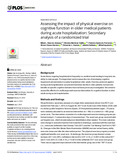Mostrar el registro sencillo del ítem
Assessing the impact of physical exercise on cognitive function in older medical patients during acute hospitalization: secondary analysis of a randomized trial
| dc.creator | López Sáez de Asteasu, Mikel | es_ES |
| dc.creator | Martínez Velilla, Nicolás | es_ES |
| dc.creator | Zambom Ferraresi, Fabrício | es_ES |
| dc.creator | Casas Herrero, Álvaro | es_ES |
| dc.creator | Cadore, Eduardo L. | es_ES |
| dc.creator | Galbete Jiménez, Arkaitz | es_ES |
| dc.creator | Izquierdo Redín, Mikel | es_ES |
| dc.date.accessioned | 2020-02-18T10:15:51Z | |
| dc.date.available | 2020-02-18T10:15:51Z | |
| dc.date.issued | 2019 | |
| dc.identifier.issn | 1549-1277 | |
| dc.identifier.uri | https://hdl.handle.net/2454/36255 | |
| dc.description.abstract | Background: Acute illness requiring hospitalization frequently is a sentinel event leading to long-term disability in older people. Prolonged bed rest increases the risk of developing cognitive impairment and dementia in acutely hospitalized older adults. Exercise protocols applied during acute hospitalization can prevent functional decline in older patients, but exercise benefits on specific cognitive domains have not been previously investigated. We aimed to assess the effects of a multicomponent exercise intervention for cognitive function in older adults during acute hospitalization. Methods and findings: We performed a secondary analysis of a single-blind randomized clinical trial (RCT) conducted from February 1, 2015, to August 30, 2017 in an Acute Care of the Elderly (ACE) unit in a tertiary public hospital in Navarre (Spain). 370 hospitalized patients (aged ≥75 years) were randomly allocated to an exercise intervention (n = 185) or a control (n = 185) group (usual care). The intervention consisted of a multicomponent exercise training program performed during 5–7 consecutive days (2 sessions/day). The usual care group received habitual hospital care, which included physical rehabilitation when needed. The main outcomes were change in executive function from baseline to discharge, assessed with the dual-task (i.e., verbal and arithmetic) Gait Velocity Test (GVT) and the Trail Making Test Part A (TMT-A). Changes in the Mini Mental State Examination (MMSE) test and verbal fluency ability were also measured after the intervention period. The physical exercise program provided significant benefits over usual care. At discharge, the exercise group showed a mean increase of 0.1 m/s (95% confidence interval [CI], 0.07, 0.13; p < 0.001) in the verbal GVT and 0.1 m/s (95% CI, 0.08, 0.13; p < 0.001) in the arithmetic GVT over usual care group. There was an apparent improvement in the intervention group also in the TMT-A score (−31.1 seconds; 95% CI, −49.5, −12.7 versus −3.13 seconds; 95% CI, −16.3, 10.2 in the control group; p < 0.001) and the MMSE score (2.10 points; 95% CI, 1.75, 2.46 versus 0.27 points; 95% CI, −0.08, 0.63; p < 0.001). Significant benefits were also observed in the exercise group for the verbal fluency test (mean 2.16 words; 95% CI, 1.56, 2.74; p < 0.001) over the usual care group. The main limitations of the study were patients’ difficulty in completing all the tasks at both hospital admission and discharge (e.g., 25% of older patients were unable to complete the arithmetic GVT, and 47% could not complete the TMT-A), and only old patients with relatively good functional capacity at preadmission (i.e., Barthel Index score ≥60 points) were included in the study. Conclusions: An individualized, multicomponent exercise training program may be an effective therapy for improving cognitive function (i.e., executive function and verbal fluency domains) in very old patients during acute hospitalization. These findings support the need for a shift from the traditional (bedrest-based) hospitalization to one that recognizes the important role of maintaining functional capacity and cognitive function in older adults, key components of intrinsic capacity. | en |
| dc.description.sponsorship | This study was funded by a Gobierno de Navarra project Resolución grant 2186/2014 and acknowledged with the 'Beca Ortiz de Landazuri' as the best research clinical project in 2014, as well as by a research grant PI17/01814 of the Ministerio de Economía, Industria y Competitividad (ISCIII, FEDER). | en |
| dc.format.extent | 14 p. | |
| dc.format.mimetype | application/pdf | en |
| dc.language.iso | eng | en |
| dc.publisher | PLoS | en |
| dc.relation.ispartof | PLoS Medicine, 16 (7): e1002852 | en |
| dc.rights | © 2019 Sáez de Asteasu et al. This is an open access article distributed under the terms of the Creative Commons Attribution License, which permits unrestricted use, distribution, and reproduction in any medium, provided the original author and source are credited. | en |
| dc.rights.uri | http://creativecommons.org/licenses/by/4.0/ | |
| dc.subject | Physical exercise | en |
| dc.subject | Cognitive function | en |
| dc.subject | Elderly | en |
| dc.subject | Hospitalizations | en |
| dc.title | Assessing the impact of physical exercise on cognitive function in older medical patients during acute hospitalization: secondary analysis of a randomized trial | en |
| dc.type | info:eu-repo/semantics/article | en |
| dc.type | Artículo / Artikulua | es |
| dc.contributor.department | Ciencias de la Salud | es_ES |
| dc.contributor.department | Osasun Zientziak | eu |
| dc.rights.accessRights | info:eu-repo/semantics/openAccess | en |
| dc.rights.accessRights | Acceso abierto / Sarbide irekia | es |
| dc.identifier.doi | 10.1371/journal.pmed.1002852 | |
| dc.relation.publisherversion | https://doi.org/10.1371/journal.pmed.1002852 | |
| dc.type.version | Versión publicada / Argitaratu den bertsioa | es |
| dc.type.version | info:eu-repo/semantics/publishedVersion | en |
| dc.contributor.funder | Gobierno de Navarra / Nafarroako Gobernua | es |
Ficheros en el ítem
Este ítem aparece en la(s) siguiente(s) colección(ones)
La licencia del ítem se describe como © 2019 Sáez de Asteasu et al. This is an open access article distributed under the terms of the Creative Commons Attribution License, which permits unrestricted use, distribution, and reproduction in any medium, provided the original author and source are credited.



